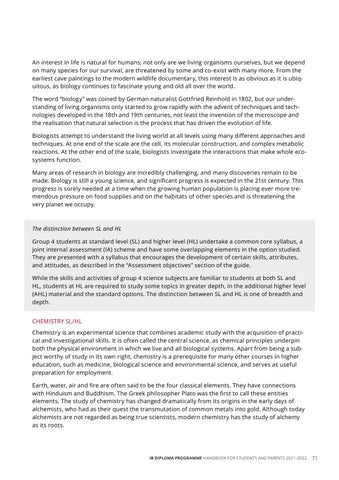An interest in life is natural for humans; not only are we living organisms ourselves, but we depend on many species for our survival, are threatened by some and co-exist with many more. From the earliest cave paintings to the modern wildlife documentary, this interest is as obvious as it is ubiquitous, as biology continues to fascinate young and old all over the world. The word “biology” was coined by German naturalist Gottfried Reinhold in 1802, but our understanding of living organisms only started to grow rapidly with the advent of techniques and technologies developed in the 18th and 19th centuries, not least the invention of the microscope and the realisation that natural selection is the process that has driven the evolution of life. Biologists attempt to understand the living world at all levels using many different approaches and techniques. At one end of the scale are the cell, its molecular construction, and complex metabolic reactions. At the other end of the scale, biologists investigate the interactions that make whole ecosystems function. Many areas of research in biology are incredibly challenging, and many discoveries remain to be made. Biology is still a young science, and significant progress is expected in the 21st century. This progress is sorely needed at a time when the growing human population is placing ever more tremendous pressure on food supplies and on the habitats of other species and is threatening the very planet we occupy.
The distinction between SL and HL Group 4 students at standard level (SL) and higher level (HL) undertake a common core syllabus, a joint internal assessment (IA) scheme and have some overlapping elements in the option studied. They are presented with a syllabus that encourages the development of certain skills, attributes, and attitudes, as described in the “Assessment objectives” section of the guide. While the skills and activities of group 4 science subjects are familiar to students at both SL and HL, students at HL are required to study some topics in greater depth, in the additional higher level (AHL) material and the standard options. The distinction between SL and HL is one of breadth and depth. CHEMISTRY SL/HL Chemistry is an experimental science that combines academic study with the acquisition of practical and investigational skills. It is often called the central science, as chemical principles underpin both the physical environment in which we live and all biological systems. Apart from being a subject worthy of study in its own right, chemistry is a prerequisite for many other courses in higher education, such as medicine, biological science and environmental science, and serves as useful preparation for employment. Earth, water, air and fire are often said to be the four classical elements. They have connections with Hinduism and Buddhism. The Greek philosopher Plato was the first to call these entities elements. The study of chemistry has changed dramatically from its origins in the early days of alchemists, who had as their quest the transmutation of common metals into gold. Although today alchemists are not regarded as being true scientists, modern chemistry has the study of alchemy as its roots.
IB DIPLOMA PROGRAMME HANDBOOK FOR STUDENTS AND PARENTS 2021–2022
71











